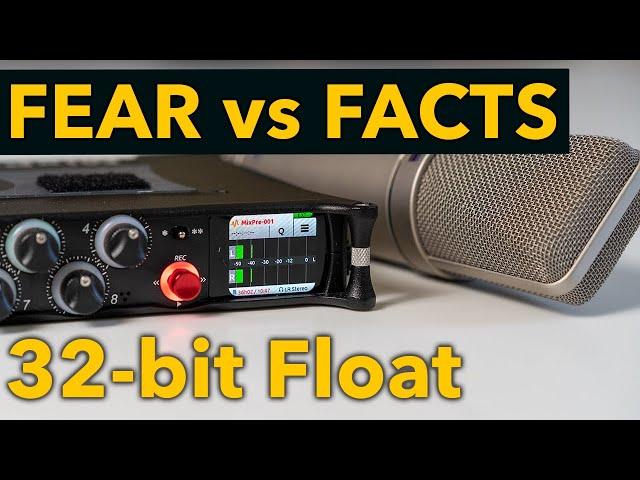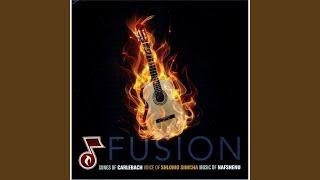
Busting 32-bit Float Myths: A New Era of Audio Recording
I interviewed Zach Kuschel at Sound Devices to help clear up some of the misconceptions around recording in 32-bit Float. I also compare recording drums in 32-bit float to 24-bit.
00:00 What I'll Cover in This Video
01:10 Marketing Confusion
03:12 32-bit Float Definition
03:45 Zach Kuschel on Recording in 32-bit
08:08 Example 32-bit Float Implementation
10:12 Noise
12:15 Drum Comparison: 24-bit vs. 32-bit Float
13:20 Dynamic Range
14:27 Philosophy
17:10 Observations
17:53 Normalizing in Reaper
This video is not sponsored.
Affiliate links help support the channel:
Sound Devices MixPre-10 II: https://amzn.to/43eraYw
Zoom F6: https://amzn.to/45FS1y7
Тэги:
#32-bit_float_recording #32-bit_float_audio_recorder #32-bit_float_explained #32-bit_float_audio_interface #recording_drums_at_home #recording_drums #interview #sound_devices #mixpre_10_ii #zoom_f6Комментарии:

such a great video, thank you so much for sharing this with us!
Ответить
The use case I can imagine for 32bit is for when you need to record something that you don't have a chance to try out first to set your levels. If you're recording a jet flying by or a building blowing up, or a space shuttle launching, that might not be repeatable and you won't have a chance to check your levels.
Ответить
Why doesn't SoundDevices more expensive 8 series recorders offer 32 bit float as an option?
Ответить
Hi!
I am just learning about these mobile recorders and wonder how you would attempt recording a band, say drums first, then bass, etc..
Do you hear playback when overdubbing? What about different takes?
... Probably trial newbie questions. Your videos are 👍

🙂👍
Ответить
what do you mean by audio normalizing? Thx
Ответить
Why won’t it catch on?
Does it sound worse? No
Does it sound better? No
Will any of us ever record anything with more than a 90db range? Probably not.
Save time by not setting gain? Combine your process of normalizing with 40 tracks, many with multiple takes, over a 12 song record, and I bet getting it right at the front end is quicker.
Still, how am I supposed to send a decent headphone mix and monitor what I’m recording without proper gain ?
You almost get one of the most important parts about the actual sound at the end. Using an API (or any analog pre) will require you to adjust the gain, and how you adjust that gain has a significant impact on what you get out of that pre. Studios aren’t going to give all their preferred pre amps even if the above mentioned problems weren’t a thing.
This set up is nice for throw and go, but it’s kinda solving a non existent problem.

Great video,
I shoot flying events, or just hang out at a local airport where anything from large Boeings to a Piper Cub can be out and about.
The 32 bot float on a Mixpre-6 Mk.2 is fantastic!

As a 16 year location Sound Dept. veteran (and hack home studio enthusiast), I can tell you that it is definitely the under paid post department that is to blame for the lack of utilizing 32-bit float. I get blow back for recommending the post department download the Sound Devices "Wave Agent" software, so that they can edit/recall meta-data or edit the mono/poly wave data...let alone, asking them to get into the weeds with editing 32-bit float.
Another issue with 32-bit float is "what else is in the signal path?". Your lavaliere's element (or diaphragm) can distort (unless you use the new DPA's) or your transmitter can over-modulate (maybe not if you have the latest A20s by Sound Devices). You'd have to REALLY plan out your signal chain to fully utilize 32-bit float....and at the end of the day, you're not getting paid any more money to rent this kit out...nor is there any guarantee that post will use it. It's not like the camera world, where RAW recording and LUTS were accepted with open arms. Sound Department is literally One-Half of the product, but is viewed as a minor annoyance.
It is going to be a LONG time before 32-bit float catches on. In the studio world, there still are no multi-channel audio interfaces with 32-bit float. Steinberg has "32-bit converters" on their interfaces, but they are not full on 32-bit float. It's like "we have a cure for cancer!" but the world responds with "meh....". Frustrating for sure.

Can you explain the normalization advantage? In traditional DAWs you just click the normalize button and that’s it so I’m wondering how it gets easier. I understand how it gives you more flexibility, but not how it makes it easier to normalize or faster.
Ответить
The brave thing would be to make recording devices with no gain control whatsoever.
The gain control doesn't set the "zero point" but the "one point": you're deciding how much dynamic range is between the number zero, and some other number that is not zero.
Also, your introduction of the term "dithering" here is inappropriate, it has nothing to do with the range selection/combination process.
Also, having more than one ADC is not strictly necessary, and for all intents and purposes 24-bit integer PCM is also fine for gainless line level ADCs... and in practice probably also fine for gainless mic preamp-ADCs, but there are extreme outlier microphones for which this is not the case.

Great video.
Once again, as with all processes in recording audio...it's "Horses for Courses".

Files are massive.
Ответить
It all boils down to: digital gain vs analog gain.
Ответить
Its crazy that there is any resistance to 32 bit. The benefits are so obvious
Ответить
I don't use 32-bit float because people are now selling perfectly good 24-bit equipment for bargain prices. 16/24-bit was fine for decades for professional workflows. It's certainly good enough for my silly hobby projects for the next few years.
Ответить
Great video!
Ответить
Hats off, man. Grest subject to cover. I agree, the experience I had with the F6 was a real gamechanger, albeit for field recording and location sound but now I want to try it for music purposes thanks to you! Subscribed.
Ответить
24 bit integer precision makes zero sense for listening to music. 24 bits are only needed for writing music because you can record your signals low and then boost them without boosting the noise floor caused by imprecision errors. You need to record your source at a very low volume, like barely hearable, much lower than whispering, for 24 bits to start having issues - but why would you even do that?
24 bit precision is 256 times more precise than the default 16 bits and a finished track will be indistinguishable between two formats.
32 bit float precision is also quite questionable because floating point numbers can be very imprecise and result in errors. To me the format always seemed like an internal way for very old DAWs to work around the hard limitation of very old audio interfaces that could only do 16 bits at a cost of extra CPU power.

I had no idea anyone would get so worked up over 32-bit FP. I record almost everything at 32-bit FP because I work in film, specifically as a sound designer, and the dynamic range is awesome. Same with dialogue. When working in 24-bit I would do something similar to what Sound Devices does with their 32-bit FP; meaning I would record to two channels, with one channel properly gain staged and another about -10dB below that. Using 32-bit FP saves me setup time, and editing time. My deliverables are still almost always in 24-bit 48kHz because that's the current industry standard. But my preference is recording in 96kHz 32-bit FP then downscaling. I've never heard a client complain, and frankly most of them don't even know enough about sound to complain. I will add that I've clipped in 32-bit FP a few times when making sound effects, and had to adjust how I'm setting up mics.
Ответить
I have Behringer XR-18 in the details I read it says 40-Bit floating-point DSP features “unlimited” dynamic range with no internal overload and near-zero overall latency , is that correct if anyone knows!
Thanks

Very cool and helpful video, thanks!
Ответить
The argument I have made for years is my consoles in the studio have about 6 DBU (+26dbu) more headroom than the best 24/32 integer converters (which run at +20dbu) on the market so if I want to slam the mixbus or push a mic preamp I am going to overload the converter, the only option was a 32 bit floating point converter like we see today. The dual gain stage of the converter gives us the headroom needed. Sadly there are not any large 24 or 32 i/o interfaces for console users like myself. But I have been using a Mixpre for about a year now as my final mixdown rig. So When we do our final mixes the output of the console is captured to a separate rig running a Macbook Pro and a mixpre. But we really need a Thunderbolt interface with DB25s and around 32 i/o to really use in commercial studios!!
Ответить
With the zoom, which I believe does not have a gain control, how do you deal with the noise floor of the preamps themselves? I would think that on a much louder source, turning down the input gain would net you less noise induced by the analog part of the preamps themselves into the 32bit digital recording. Even with two separate preamp circuits, that is two different gain levels, and a compromise on the analog side, I would think? Especially if you are using a microphone like an RE-27 that requires a lot of gain to get a usable level out of it, about 60db of gain on an 1173 with a singer right on the grill, but less if you are using it on a floor tom with a heavy handed drummer, or a kick drum, etc.
Ответить
The question of whether it has anything to do with Led Zeppelin depends on how you spell it... Fabric? or Geographical Region? :)
Ответить
If you export your 24 bit 32 bit float recording example to Soundcloud in 24 bit wav format i think we probably will hear a difference. But You tube audio quality MP4 is often about 192 kbps MP3. What do you upload?
Ответить
A good comparison would be a camera's focus (or f-stop/ISO/shutter for that matter).
Imagine shooting a 30 minute interview with the camera out of focus. Imagine being able to pull that focus in post. That's what 32 bit float can theoretically offer.
Most professionals manually pull focus in the same way audio engineers gain stage, There's a specific person that solely operates and pulls focus and they get paid LOTS.
Most resistance to utilizing auto focus was purely due to it's poor and inaccurate implementation, usually resulting in undesired, adverse, effects.
People need to experience 32 bit float in order to trust it, in the same way you would need to experience and play around with good quality, modern, auto focus.
Auto focus works well for people who don't have the in-depth knowledge or patience to dial in exactly what they want, 32 bit float satisfies that exact notion.
Someone who's been working in audio for ages would have zero need or use for 32 bit float because they know exactly how to capture what they want, the same exact way a photographer uses manual mode because they've learned exactly how and why to configure the settings to accommodate the desired outcome.
Technology like 32 bit float audio recording is such a massive step, that it's hard to even justify the amount of freedom it could restore to an artist. We've grown so accustomed to only being able to capture a hollow representation of audio and that it's been proven time and time again that any step further gives us diminishing returns.
So despite the heavy resistance in standard use cases, 32 bit float can and should thrive within it's own, separate, classification of audio capture. The same way we have stereoscopy, or 360 action cam videos.
At the end of the day it's just simply a different way of representing captured information, and therein lies the root of the problem; since it's a different way of representing audio, the thought process revolving around it should also be reconsidered.

32bit changed everything! I have zoom f3 and I have 2 lav recorders now zoom f2s! Zoom f2 has no gain control at all! For video production on a go 32 bit is must have. MixPre is my next buy 😎🙏 thank you for promoting 32bit 🫡
Ответить
These vids are quite good, I’m keen to get into 32 bit mode.
Ответить








![[MV] 이달의 소녀_고원 (LOONA_Go Won) _One&Only_in_432_hz [MV] 이달의 소녀_고원 (LOONA_Go Won) _One&Only_in_432_hz](https://invideo.cc/img/upload/WV9rbjZSX3dCOUo.jpg)
















